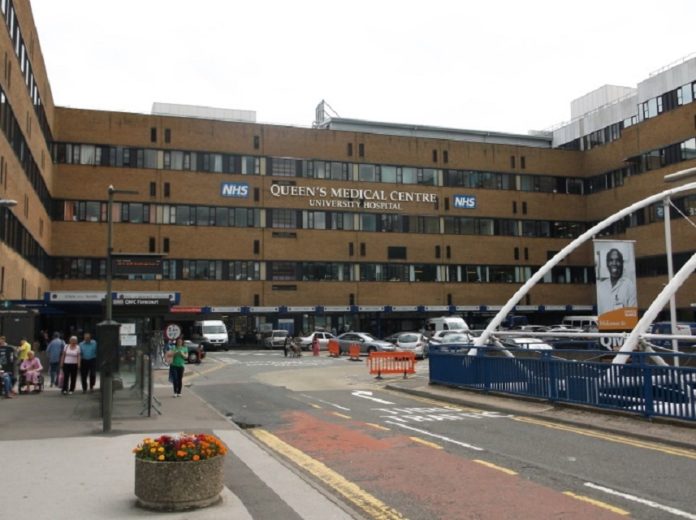
By Matt Jarram, Local Democracy Reporter
Councillors questioned the HR director at Nottingham’s hospitals after a culture of bullying and racism was unearthed during a major inspection of the trust.
Nottingham University Hospitals NHS Trust (NUH) – which includes the Queen’s Medical Centre and City Hospital – were handed a ‘requires improvement’ rating last year.
Health watchdog, the Care Quality Commission (CQC), said there was “a culture of bullying” at the trust as well as inadequate leadership.
In a separate probe, the maternity services were also deemed as ‘inadequate’ following a number of baby deaths and incidents where children were born with brain injuries.
Health bosses including HR director Dr Neil Pease, medical director Dr Keith Girling and acting chief executive Rupert Egginton attended a health scrutiny council meeting on Thursday, January 13.
Councillors quizzed the HR director about what was being done to combat racism and bullying across the organisation. The exact number of bullying cases being investigated have not been disclosed.
However, trade union, Unison, had previously raised concerns on behalf of more than 20 employees it says were allegedly subjected to bullying and intimidation while caring for dying Covid patients.
Cllr Sam Gardiner (Lab), representing Bulwell Forest, said to Dr Pease: “The CQC report highlighted bullying in the organisation, I would have thought in your position that should have been something you were aware of?”
Dr Pease, who has been the HR director at NUH for two years, responded: “This is my fourth executive job in the NHS as HR director and from when I started in January 2020, I think we pretty much went into the tsunami of Covid, so it was all hands to the pump.
“We dealt with a lot of allegations of bullying across my time at NUH, but I would not have said it was disproportionately larger than any other trust I have worked at in terms of the amount and type of claims that were dealt with.
“We have tried to open up communication channels across the organisation and work with trade unions and under-represented groups.
“We had a lot of cases we were dealing with, but I would not say they were disproportionately higher.
“When we received the CQC report we were shocked and tried to proactively increase our efforts around this area.
“Some people have left NUH a long while ago but still feel pretty upset about their treatment. We have other areas where people have raised concerns which we think might fall into poor culture and commissioned an external review of those areas.
“And then we have got other complaints that look like pure bullying – they are the ones we are proactively dealing with and where we have not got the band-capacity we have asked external investigators to come in and look at those areas to get them through faster.
“What we need to do better is feeding back the outcomes of these investigations. Without naming people or groups or individuals we will be feeding back a lot more the outcomes of these concerns.”
He said there had been a relaunch of the disciplinary policy looking at “rather than who is to blame, what is the cause of this”.
There will also be peer mentors to support those who raise concerns to stand “side by side with them” during the investigation.
Cllr Georgia Power (Lab), chair of the health scrutiny committee, said: “I am just a little bit confused – I get you are in a large organisation – and dealing with bullying and racism – but in your opinion, it was not wildly disproportionate to other trusts, but the CQC clearly thought otherwise.
“Their report says there was a higher level of bullying and racism than expected – and that was your own figures reported to the CQC.”
Cllr Maria Joannou (Lab), who represents Bulwell, added: “It was a very toxic culture – where you were not listening to frontline staff, and they did not feel they could come to you. There are some horrendous examples particularly people in the BAME community – you have to take responsibility.”
Mr Egginton said: “The board in no way supports bullying in the organisation.
“Personally, we have been into the theatres where we have heard about an example of bullying of staff. One of the features, during the pandemic, is we have had to ask our staff to do all sorts of things – roles that are not their core role to meet the needs of patients.
“The opportunity for people to feel like they are being pushed around by management instruction is greater and that is something we are very alert to and trying to describe to our organisation.
“That we do have to respond to the pandemic, but we have to manage our teams sympathetically and effectively and don’t create those impressions.”
Dr Girling added: “The psychological safety of staff to speak up had been repressed and we were shocked by the level of concern.
“It feels different now to what it did a few months ago. We have made progress, we are in the right direction, but we have got a way to go.”
The trust is hoping significant improvements will be made by January 28 and that re-inspection by the CQC will take place in June 2022.



















